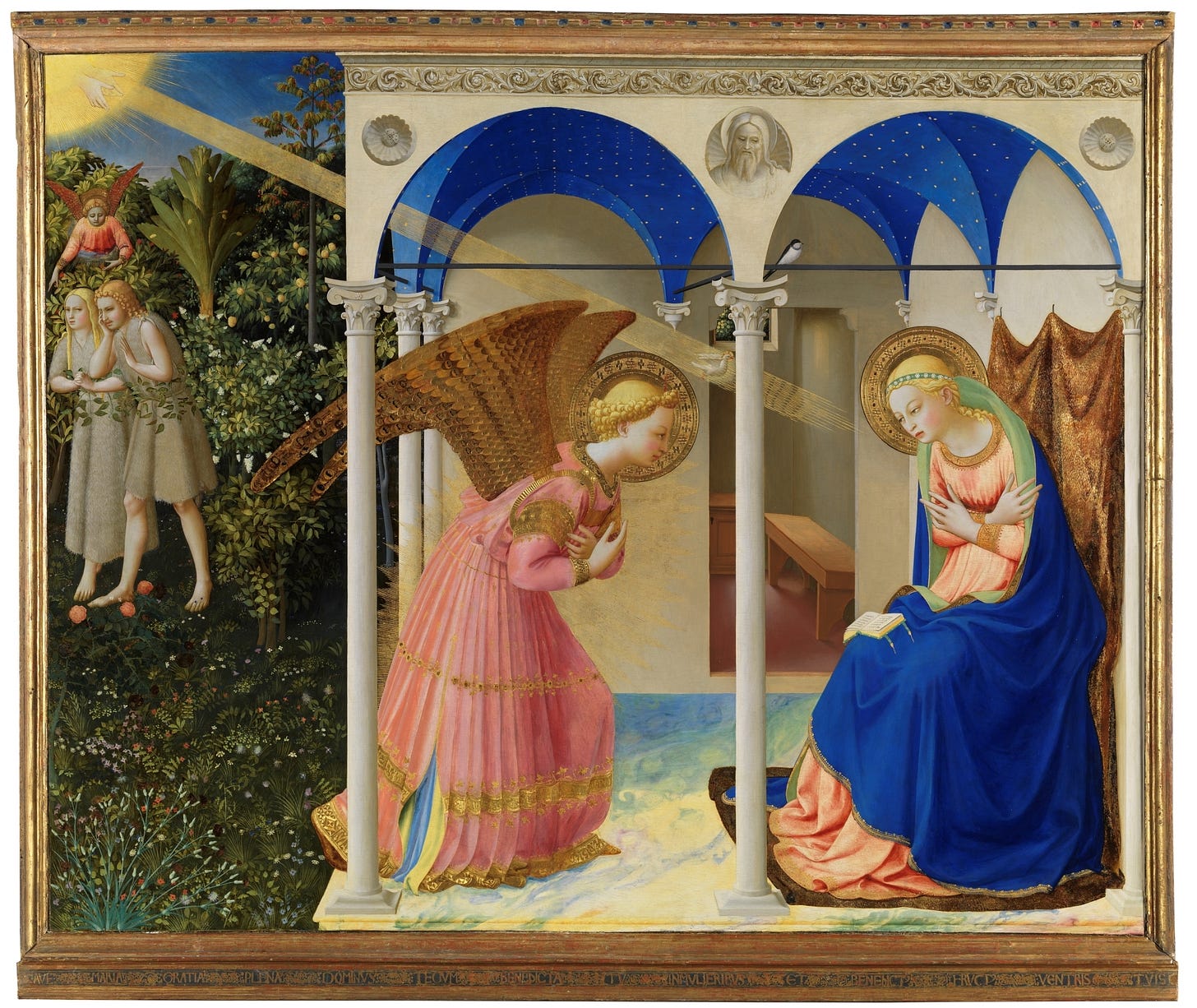Today is the Feast of the Annunciation
The Mystery of the Annunciation
Today is the Feast of the Annunication. In today’s reflection, St. Leo explores the Great explores the mystery of the Incarnation—Jesus Christ as fully divine and fully human. God in His grace and mercy chose to embrace humanity's limitations—majesty assuming lowliness, eternity entering into mortality, and the invulnerable joining with the vulnerable. Why would God offer this mysterious and beautiful gift? This was done to reconcile us to Him—to bridge the chasm sin had created. Jesus, our mediator who would suffer and overcome death—giving all of mankind the gift of salvation.
Jesus embodies the perfect union of both natures, untainted by sin, fully God and fully man. This union was not a temporary condition but a permanent state, wherein Jesus maintained his divine attributes while fully participating in the human experience, except sin. Through this act of humility and compassion, God did not diminish his omnipotence but showed his deep love for humanity, choosing to enter into our condition to redeem and elevate it.
On this special feast day, may we contemplate the significance of Jesus's Incarnation as a new birth, where the invisible became visible, the eternal entered time, and the Lord of all became a servant, embracing mortality to deliver humanity from death. May we come to a deeper understanding of just how much God loves us.
The Mystery of Man's Reconciliation with God
From a letter of Saint Leo the Great, pope
Lowliness is assumed by majesty, weakness by power, mortality by eternity. To pay the debt of our sinful state, a nature that was incapable of suffering was joined to one that could suffer. Thus, in keeping with the healing that we needed, one and the same mediator between God and men, the man Jesus Christ, was able to die in one nature, and unable to die in the other.
He who is true God was therefore born in the complete and perfect nature of a true man, whole in his own nature, whole in ours. By our nature we mean what the Creator had fashioned in us from the beginning, and took to himself in order to restore it.
For in the Saviour there was no trace of what the deceiver introduced and man, being misled, allowed to enter. It does not follow that because he submitted to sharing in our human weakness he therefore shared in our sins.
He took the nature of a servant without stain of sin, enlarging our humanity without diminishing his divinity. He emptied himself; though invisible he made himself visible, though Creator and Lord of all things he chose to be one of us mortal men. Yet this was the condescension of compassion, not the loss of omnipotence. So he who in the nature of God had created man, became in the nature of a servant, man himself.
Thus the Son of God enters this lowly world. He comes down from the throne of heaven, yet does not separate himself from the Father’s glory. He is born in a new condition, by a new birth.
He was born in a new condition, for, invisible in his own nature, he became visible in ours. Beyond our grasp, he chose to come within our grasp. Existing before time began, he began to exist at a moment in time. Lord of the universe, he hid his infinite glory and took the nature of a servant. Incapable of suffering as God, he did not refuse to be a man, capable of suffering. Immortal, he chose to be subject to the laws of death.
He who is true God is also true man. There is no falsehood in this unity as long as the lowliness of man and the pre-eminence of God coexist in mutual relationship.
As God does not change by his condescension, so man is not swallowed up by being exalted. Each nature exercises its own activity, in communion with the other. The Word does what is proper to the Word, the flesh fulfils what is proper to the flesh.
One nature is resplendent with miracles, the other falls victim to injuries. As the Word does not lose equality with the Father’s glory, so the flesh does not leave behind the nature of our race.
One and the same person – this must be said over and over again – is truly the Son of God and truly the son of man. He is God in virtue of the fact that in the beginning was the Word, and the Word was with God, and the Word was God. He is man in virtue of the fact that the Word was made flesh, and dwelt among us.
The Feast Day of the Annunciation
℟. The angel Gabriel was sent to announce the word to Mary, a virgin betrothed to Joseph, and she began to fear the light. ‘Mary, do not be afraid, you have won the Lord’s favor: You are to conceive and bear a son; he shall be called Son of the Most High, alleluia.’
℣. ‘Hail Mary, full of grace, the Lord is with you. You are to conceive and bear a son; he shall be called Son of the Most High, alleluia.’



